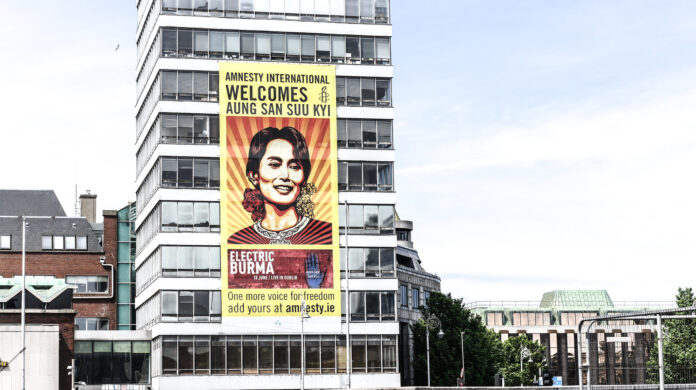Il colpo di Stato militare del 1962
Quando nella tormentata penisola indocinese lo Stato del Myanmar si diede un ordinamento che assicurava ai suoi cittadini le libertà e i diritti dei Paesi più evoluti, l’opinione pubblica mondiale salutò positivamente tale evento. A partire dal 1948, anno dell’emancipazione dal dominio coloniale inglese, la democrazia faceva i suoi primi passi, ma nel 1962 un colpo di stato militare bloccò questo processo. Ebbe inizio un lungo periodo di gestione autoritaria, gli oppositori furono incarcerati e le manifestazioni popolari duramente represse.
La vittoria della Lega Nazionale per la Democrazia guidata da Aung San Suu Kyi
A partire dal 1990 la situazione politica sembrò mutare e furono permesse libere elezioni. Ma esse furono annullate dalle forze armate a seguito della vittoria della Lega Nazionale per la Democrazia (LND), guidata dal Premio Nobel per la Pace nel 1991, Aung San Suu Kyi, che venne messa agli arresti domiciliari insieme agli altri leader del partito. Seguì un decennio di disordini e di repressioni violente, segnate da frequenti incarcerazioni dei leader dell’opposizione. Nel 2010 la giunta militare permise libere elezioni che furono vinte dalle formazioni che la sostenevano. Ue e Usa non ne riconobbero la validità denunciando brogli e irregolarità.
Le difficoltà post elezioni
Le successive elezioni del 2012 e del 2015 fecero registrare la vittoria di Aung San Suu Kyi, anche se una norma costituzionale riservava il 25% dei seggi parlamentari ai militari. I prigionieri politici vennero liberati, i sindacati legalizzati e il rispetto dei fondamentali diritti civili garantito. Ma il governo del LND dovette affrontare enormi difficoltà, cioè la presenza nel Paese di differenti gruppi etnici, in costante conflitto fra loro, e la povertà generale che affligge la maggioranza dei 55 milioni di abitanti del Paese.
Un nuovo colpo di Stato
I militari si sono resi responsabili fra il 2016 e il 2017 di massacri e violenze a danno dell’etnia rohingya, e furono denunciati per tentato genocidio. Le elezioni del Novembre 2020 riconfermarono la Lega Nazionale per la Democrazia, ma il 1° febbraio del 2021 ancora una volta i militari hanno dato vita a un nuovo colpo di stato, arrestando i membri del governo, oppositori e leader di forze sociali. In tutto il Paese hanno luogo proteste popolari, represse duramente dalla polizia e dall’esercito. La strada per la democrazia in Myanmar sembra drammaticamente lunga e difficile.
The military coup in 1962
When in the troubled Indochinese peninsula the state of Myanmar gave itself an order that ensured its citizens the freedom and rights of the most advanced countries, world public opinion welcomed this event positively. From 1948, year of the emancipation from British colonial rule, democracy took its first steps. However, in 1962 a military coup blocked this process. A long period of authoritarian management began, opponents were jailed and popular demonstrations severely repressed.
The victory of the National League for Democracy led by Aung San Suu Kyi
In 1990 the political situation seemed to change, and free elections were allowed. Nonetheless, they were declared void by the military due to the victory of the National League for Democracy (NLD). This party was led by the 1991 Nobel Peace Prize winner, Aung San Suu Kyi, who was placed under house arrest along with other party leaders. A decade of unrest and violent repression followed, marked by frequent incarceration of opposition leaders. In 2010 the military junta allowed free elections which were won by the political groups which supported the junta. Therefore, the EU and the US did not recognize its validity, denouncing fraud and irregularities.
Post – election difficulties
Aung San Suu Kyi won the elections of 2012 and 2015, even though a constitutional rule reserved 25% of parliamentary seats for the military. Political prisoners were released, trade unions legalized and respect for fundamental civil rights guaranteed. However, the NLD government had to face enormous difficulties, namely the presence of different ethnic groups, in constant conflict with each other, and the general poverty that afflicts the majority of the 55 million inhabitants of the country.
A new coup
The military was responsible for massacres and violence against the Rohingya ethnic group between 2016 and 2017, and they were reported for attempted genocide. The elections of November 2020 were won by the National League for Democracy, but on February 1, 2021, the military once again launched a new coup, arresting members of the government, opponents and leaders of social forces. Popular protests take place throughout the country, severely repressed by the police and the army. The road to democracy in Myanmar seems dramatically long and difficult.








